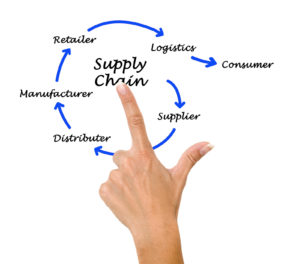It has long been proven that collaborating across the supply chain is a win-win for all involved, delivering substantial benefits and value. Research shows that 79 percent of companies with high-performing supply chains achieve revenue growth superior to the average within their industries (Deloitte 2014 survey). As a comparison, just 8 percent of businesses with less-capable supply chains report above-average growth. In a competitive marketplace, this advantage is crucial for success.
 Equitable Food Initiative (EFI) understands this value and brings together everyone from each stage of the supply chain to collaborate on the produce industry’s most pressing challenges. As a result, workers at all levels of the organization better understand their role within the supply chain and work toward improving quality and preventing food safety issues. As Luis Octavio Lopez Calzada, Leadership Team member at JV Smith Companies, noted, “If we want to improve, we need to do it as a team, and as a team we understand that we need to produce something of high quality so that our buyers are pleased with the product and that consumers enjoy the product. If we make our buyers happy with our quality, there will be more sales and we all benefit.”
Equitable Food Initiative (EFI) understands this value and brings together everyone from each stage of the supply chain to collaborate on the produce industry’s most pressing challenges. As a result, workers at all levels of the organization better understand their role within the supply chain and work toward improving quality and preventing food safety issues. As Luis Octavio Lopez Calzada, Leadership Team member at JV Smith Companies, noted, “If we want to improve, we need to do it as a team, and as a team we understand that we need to produce something of high quality so that our buyers are pleased with the product and that consumers enjoy the product. If we make our buyers happy with our quality, there will be more sales and we all benefit.”
Some of the most successful companies have built their businesses by becoming more strategic with supply chain collaboration. Walmart is a great example of this, and today the retail giant operates more than 11,700 stores under 59 company names, with 2.3 million employees in 28 countries around the world while managing an average of $32 billion in inventory, according to Supply Chain Digest.
Early on, Walmart strategically removed links from the grocery supply chain and pioneered the use of vendor-managed inventory. It also created strategic partnerships with vendors in an effort to reduce prices. “I don’t believe there is a university in the world that doesn’t talk about Walmart and the supply chain,” said James Crowell, Director of the Supply Chain Management Research Center at the Walton College of Business. “They are just so well respected because they do it so well.”
But even large companies who’ve built international brands can come to recognize the importance of supply chain collaboration. Nestlé is a good example. In 2016, the company used a crowdsourcing initiative entitled InGenius to facilitate two-way communication about supply chain challenges, problems, ideas and solutions. The goal was to provide a “safe place” for its 36,000 personnel who are directly involved in its supply chain to share ideas, including proposals for startups with business potential.
Nestlé has also taken key steps to “green” its supply chain with what it refers to as a “life-cycle approach.” This includes identifying the environmental impact of a product at every stage in its life cycle. For Nespresso coffee products, Nestlé started with coffee farmers at the very top of the supply chain, evaluating sustainability practices at the farms and coaching farmers through a continuous improvement process.
 EFI fosters continuous improvement with its workforce development program that brings profound cultural shifts to farms, leading to a collaborative and respectful work environment, an engaged workforce and strong relationships based on trust and transparency. EFI partners with growers and retailers to create a more transparent food chain, safer food and healthier places to work. As one EFI-certified farm manager stated, “When managers and workers come together as part of the Leadership Team, the workers will often have the best solutions to the problems the team is collaborating on. And when the workers hear from management how much their expertise is valued and how management wouldn’t have been able to come up with a good solution without them, they feel a greater sense of ownership and pride for the good of the company.”
EFI fosters continuous improvement with its workforce development program that brings profound cultural shifts to farms, leading to a collaborative and respectful work environment, an engaged workforce and strong relationships based on trust and transparency. EFI partners with growers and retailers to create a more transparent food chain, safer food and healthier places to work. As one EFI-certified farm manager stated, “When managers and workers come together as part of the Leadership Team, the workers will often have the best solutions to the problems the team is collaborating on. And when the workers hear from management how much their expertise is valued and how management wouldn’t have been able to come up with a good solution without them, they feel a greater sense of ownership and pride for the good of the company.”
Supply chain collaboration can also be a valuable preventative measure in avoiding food safety issues and other potential crises. As Ernie Farley, Partner, Andrew & Williamson Fresh Produce, and EFI Board Chair, noted, “By relying on the relationships we’ve made through the EFI network, we were able to navigate issues that could have turned into full-blown crises. Bringing together multiple points of view has strengthened our business and our response to issues.”
In summary, collaborating across the supply chain has numerous benefits with reducing risks, becoming more strategic, empowering employees, improving quality and enhancing customer relationships. Now that’s a recipe for success! To get started with EFI’s workforce development program, contact business@equitablefood.org.

